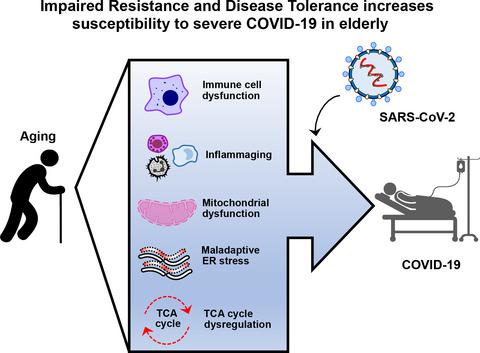Our official English website, www.x-mol.net, welcomes your feedback! (Note: you will need to create a separate account there.)
The effects of aging on host resistance and disease tolerance to SARS-CoV-2 infection
The FEBS Journal ( IF 5.4 ) Pub Date : 2020-10-30 , DOI: 10.1111/febs.15613 Darren Z L Mok 1 , Candice Yuen Yue Chan 2 , Eng Eong Ooi 1, 3, 4, 5, 6 , Kuan Rong Chan 1
The FEBS Journal ( IF 5.4 ) Pub Date : 2020-10-30 , DOI: 10.1111/febs.15613 Darren Z L Mok 1 , Candice Yuen Yue Chan 2 , Eng Eong Ooi 1, 3, 4, 5, 6 , Kuan Rong Chan 1
Affiliation

|
The ongoing coronavirus disease 2019 (COVID-19) crisis caused by severe acute respiratory syndrome coronavirus 2 (SARS-CoV-2) has triggered a large-scale pandemic that is afflicting millions of individuals in over 200 countries. The clinical spectrum caused by SARS-CoV-2 infections can range from asymptomatic infection to mild undifferentiated febrile illness to severe respiratory disease with multiple complications. Elderly patients (aged 60 and above) with comorbidities such as cardiovascular diseases and diabetes mellitus appear to be at highest risk of a severe disease outcome. To protect against pulmonary immunopathology caused by SARS-CoV-2 infection, the host primarily depends on two distinct defense strategies: resistance and disease tolerance. Resistance is the ability of the host to suppress and eliminate incoming viruses. By contrast, disease tolerance refers to host responses that promote host health regardless of their impact on viral replication. Disruption of either resistance or disease tolerance mechanisms or both could underpin predisposition to elevated risk of severe disease during viral infection. Aging can disrupt host resistance and disease tolerance by compromising immune functions, weakening of the unfolded protein response, progressive mitochondrial dysfunction, and altering metabolic processes. A comprehensive understanding of the molecular mechanisms underlying declining host defense in elderly individuals could thus pave the way to provide new opportunities and approaches for the treatment of severe COVID-19.
中文翻译:

衰老对宿主对 SARS-CoV-2 感染的抵抗力和疾病耐受性的影响
由严重急性呼吸综合征冠状病毒 2 (SARS-CoV-2) 引起的 2019 冠状病毒病 (COVID-19) 危机正在持续,引发了一场大规模流行病,影响了 200 多个国家的数百万人。SARS-CoV-2 感染引起的临床谱包括从无症状感染到轻度未分化发热性疾病,再到伴有多种并发症的严重呼吸道疾病。患有心血管疾病和糖尿病等合并症的老年患者(60 岁及以上)似乎出现严重疾病结果的风险最高。为了防止 SARS-CoV-2 感染引起的肺部免疫病理学变化,宿主主要依赖两种不同的防御策略:抵抗和疾病耐受。抵抗力是宿主抑制和消除传入病毒的能力。相比之下,疾病耐受性是指促进宿主健康的宿主反应,无论其对病毒复制的影响如何。抵抗力或疾病耐受机制或两者的破坏可能会导致病毒感染期间患严重疾病的风险增加。衰老会通过损害免疫功能、削弱未折叠蛋白反应、进行性线粒体功能障碍和改变代谢过程来破坏宿主的抵抗力和疾病耐受性。因此,全面了解老年人宿主防御能力下降的分子机制可以为治疗严重的 COVID-19 提供新的机会和方法铺平道路。
更新日期:2020-10-30
中文翻译:

衰老对宿主对 SARS-CoV-2 感染的抵抗力和疾病耐受性的影响
由严重急性呼吸综合征冠状病毒 2 (SARS-CoV-2) 引起的 2019 冠状病毒病 (COVID-19) 危机正在持续,引发了一场大规模流行病,影响了 200 多个国家的数百万人。SARS-CoV-2 感染引起的临床谱包括从无症状感染到轻度未分化发热性疾病,再到伴有多种并发症的严重呼吸道疾病。患有心血管疾病和糖尿病等合并症的老年患者(60 岁及以上)似乎出现严重疾病结果的风险最高。为了防止 SARS-CoV-2 感染引起的肺部免疫病理学变化,宿主主要依赖两种不同的防御策略:抵抗和疾病耐受。抵抗力是宿主抑制和消除传入病毒的能力。相比之下,疾病耐受性是指促进宿主健康的宿主反应,无论其对病毒复制的影响如何。抵抗力或疾病耐受机制或两者的破坏可能会导致病毒感染期间患严重疾病的风险增加。衰老会通过损害免疫功能、削弱未折叠蛋白反应、进行性线粒体功能障碍和改变代谢过程来破坏宿主的抵抗力和疾病耐受性。因此,全面了解老年人宿主防御能力下降的分子机制可以为治疗严重的 COVID-19 提供新的机会和方法铺平道路。

























 京公网安备 11010802027423号
京公网安备 11010802027423号